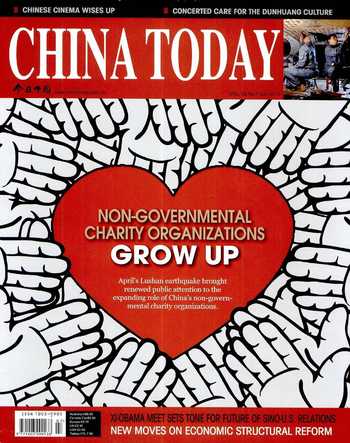Enterprise Philanthropy–A Social Responsibility
By staff reporter LI YUAN


ON May 7, 2013, the Jiaduobao (JDB) Beverage Group, the China Foundation for Poverty Alleviation, and the China Youth Development Foundation held a joint press conference in Beijing. It was an odd assembly – JDB makes herbal tea and other drinks, while the two foundations are the beating heart of Chinas philanthropic movement. The resulting brew, however, was extremely palatable: representatives from the three organizations revealed the “Jiaduobao Strategy for Developing Philanthropic Programs,” and JDB announced its 2013 charity strategy initiatives and its White Paper on Philanthropic Programs.
JDBs program is built on the philosophy that philanthropic efforts should aim to reach the broadest possible swathe of society. For charitable organizations, such a mantra is nothing new; indeed, it is often their charter. But for a successful enterprise such as JDB to enshrine philanthropy in its corporate culture represents a significant step forward towards a more humanistic society.
As charity initiatives on Chinas mainland continue to gain traction with the wider public, the growing enterprise philanthropy movement is proving to be a strong force for positive change.
A Rising Force
JDB donated RMB 100 million to Lushan soon after a 7.0-magnitude quake struck the area on April 20, 2013. This represents the largest single donation thus far from any company in China for Lushan quake victims. The enterprise also donated RMB 100 million to relief efforts for the Wenchuan earthquake in 2008, and 110 million to Yushu earthquake victims and reconstruction in 2010.
“JDB Group is always there for the victims of natural disasters. When it comes to enterprise philanthropy, we dont mean just one or two large donations. For all those places and victims in need, we need enterprises that believe in charity to be there and provide whatever assistance they are capable of. JDB fulfills enterprises social responsibility with its actions,” said Liu Wenkui, secretary general of the China Foundation for Poverty Alleviation.
Pang Zhenguo, secretary of JDB Groups Party Committee, is modest about his Groups charitable endeavors. “It doesnt matter how much youve donated; whether its RMB 1 or 100 million. In the face of disaster, showing care and concern for those affected is not enough. If youve got the means, you need to turn that care and concern into timely action,” said Pang.
As the Lushan earthquake struck, enterprises reacted more quickly than they did after the Wenchuan earthquake in 2008. Within just 24 hours of the worst of the tremors in Lushan, nearly 40 Chinese enterprises had donated monetary or material aid to quake-stricken areas, with pledged donations exceeding RMB 140 million.
“These enterprises donations are a continuation of the charitable acts we saw during the massive Wenchuan earthquake five years ago. Business has become a major force in Chinas philanthropic cause,” said Wang Zhenyao, head of the China Philanthropy Research Institute at Beijing Normal University. During the Wenchuan post-quake reconstruction, more than RMB 50 billion was donated from around the country.
Over the past few years, many more enterprises have become involved in Chinas philanthropic cause. On the 2013 China Philanthropy List, announced on April 27 during an event at Beijings Water Cube Stadium, it was revealed that 23 enterprises donated more than RMB 100 million the previous year. Besides natural disasters, donations from enterprises mainly target education and poverty relief programs for students. Some businesses also donate funds to support public welfare and other extant government initiatives such as those to encourage female entrepreneurship and promote womens rights.
“For a long time, philanthropy was deemed an alternative to government work. But now charitable causes are recognized as the backbone of social development. They are becoming a major part of social life. A “huge-sum donation era” of sorts is coming to China, and this shows that the countrys enterprises are awakening to the idea of charity as a corporate responsibility,” said Wang Zhenyao.
As charity catches on in business circles on the mainland, enterprises are exporting Chinas newfound philanthropic inklings abroad. A number of enterprises are on record as already having donated funds and carried out charitable programs on foreign soil. In 2011, for example, the Tianjiu Confucian Business Group and the China Insight Holding Group appeared on the China Philanthropy List for each donating RMB 100 million to China-Africa Proj-ect Hope, which aims to build 1,000 “Hope” Schools within 10 years for school-less communities in Africa. The program kicked off in Tanzania in March 2011.
“[Overseas charity] is an enterprises social responsibility, as well as a good way to establish a positive public image and even gain social capital. With more Chinese enterprises heading abroad, we expect to see the philanthropic trend continue,” said Wang Zhenyao.
Worries about Enterprise Philanthropy
In the public consciousness, enterprises exist to do one thing: turn a profit. When a business then just gives away money – even if that money is for charitable causes – people get suspicious. JDB Group, which has donated more than RMB 300 million in the past five years, was once questioned about its motives. Charges against which it had to defend itself included “consuming disasters,” “making a show,”and “acting purely for publicity and media exposure.”Entrepreneurs including Chen Guangbiao and Wang Shi, both of whom have done high-profile charity work, also found themselves defending their actions.
In Chinas traditional concept of philanthropy, the maxim “actions speak louder than words” held strong. Todays budding philanthropist-entrepreneurs are finding it truer than ever. High-profile businessmen keep their donations low profile. In April, JDB Group wrote a short post about the Lushan earthquake on its official micro-blog and mentioned it was donating RMB 100 million. Soon after, in another post JDB called on people to focus on the disaster and what they could do to help, rather than on charity efforts so far.
A member of staff at a large domestic poverty alleviation foundation revealed that the project of which he is in charge raises annual funds of more than RMB 10 million, which mainly come from entrepreneurs private donations. Some entrepreneurs donate large fixed sums annually; most ask for their names not to be made known to the public.
Undoubtedly there are enterprises and businessmen out there who deem charity work a business opportunity or a marketing and advertisement tool. A common tactic is to show philanthropic enthusiasm only for high profile, government-backed causes –enterprises expect wider public recognition and some kind of return later on in the form of government favoritism. However, such businesses dont speak for the majority of Chinas corporate philanthropists.“Such cases reflect only the immature philanthropic culture of a few enterprises and dont represent the whole situation of enterprise philanthropy,” commented Yu Hai, a professor with the School of Social Development and Public Policy, Fudan University.
“Give roses to others and the fragrance will linger on your hands. Positive feedback encourages more enterprises to take action,” said Wang Zhenyao, who believes Chinas charity “marketing” needs to do more to recognize and laud givers.
“We should applaud and encourage enterprisesphilanthropic acts, such as that of JDB. Their charity work has encouraged the public to afford greater attention to disaster-stricken areas, triggered broader awareness of enterprises social responsibilities, and passed on positive energy. Even when it comes to publicity-seeking businesses, we shouldnt label them‘hypocrites for their charity efforts. Society should always harbor a positive attitude toward enterprises that do charity work. As the old Chinese saying goes,‘A butcher becomes a Buddha the moment he drops his cleaver. Similar views can be found in the teachings of Christianity. Besides, doing more charity work urges enterprises to do their other work better.”
Some enterprises carry out charitable investments through their own foundations. However, due to widely held misconceptions about the nature of such arrangements, the general public holds a low opinion of such enterprises. Many assume their motivation for donating through private foundations is tax avoidance. To a certain extent, it is.
“Using preferential tax policies to encourage donations doesnt go against the basic idea of philanthropy. Its also a common practice worldwide. If you actually sit down and look at Chinas preferential tax policies for donations, the conditions arent actually that great. In a lot of ways, they are insufficient. More measures should be taken to encourage the development of philanthropy in China,” said Ma Hongman, a professor at Fudan University in Shanghai.
At present, fewer than 1,000 private foundations exist on the Chinese mainland. Only a few hundred are enterprise foundations. The number of enterprise foundations in America exceeds 100,000.
Going Ahead
Michael Porter, a professor with Harvard Busi-ness School, divides corporate social responsibility into two categories: reactive and strategic. At present, increasing numbers of Chinese enterprises have said goodbye to the traditional money-donation philanthropic model and have begun exploring more targeted, strategic and long-term philanthropy goals.“Give a man a fish, and he can eat for a day. Give a man a fishing rod, and he can eat for a lifetime,” is an apt expression that sums up the logic. Enterprises are realizing that they should use their financial capital not only to help in disaster scenarios, but also to aid those in need in normal times.
Wang Yuegui, deputy general manager of JDBs Brand Management Department, refers to two sustainable strategies for charity work his company has created: a constructive poverty alleviation program, and a financial aid program for poverty-stricken students.
The businesss constructive poverty alleviation program is targeted at post-disaster relief and reconstruction efforts. It was successfully deployed in the aftermaths of the Yushu earthquake and the Zhouqu mudslide, with good money offered in the form of small loans to help local villagers rebuild their greenhouses and farmers markets and restore their transportation sector, for example. In contrast with oneoff donations, these projects provide local residents with livelihoods and the opportunity to help themselves. Their incomes benefit as their communities are rebuilt.
JDBs financial aid program for poverty-stricken students has been running for 12 years. The program not only empowers more students to go to school, but also encourages them to get involved in their own charitable causes.
“JDB has fine-tuned its charity programs in recent years. Its gone from reactive to strategic. Only through shouldering more strategic social responsibilities can enterprises create real positive impacts on society and foster greater social benefits,” said Liu Wenkui, secretary general of the China Foundation for Poverty Alleviation.
JDBs philanthropic philosophies, namely “charity is for the public good,” and “everyone should get involved,” are intended to arouse public awareness of philanthropic participation, motivate people to start their own charity programs and eventually get more people behind existing programs.
The idea that everyone should get involved in charity was actually presented to the public on a national scale as the China Foundation for Poverty Alleviation held a ceremony to commemorate 20 years since its founding on April 1, 2009.
“A single enterprise is quite limited in what it can do,” says Wang Yuegui. “The healthy development of Chinas non-governmental philanthropic sector needs a broad swathe of committed people to get involved, right through from grass-roots advocates and volunteers to managers and strategic consultants.”
Hopefully JDBs work is the start of a trend. If more enterprises learn to fulfill their social respon- sibilities through long-term programs that target specific problems, such as poverty, the beneficiaries of these programs should grow up with an understanding of the power of charity. Some may become philanthropy advocates in their own right. The more people that get involved in charity work, the more social benefits accrue. Its an upward spiral.

